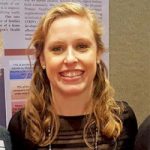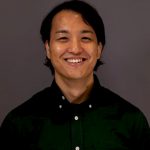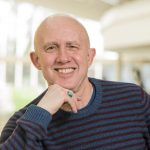 Marea Tsamaase received her Ph.D. from HDFS in May 2019. Prior to joining the UConn doctoral program, Marea attained a Masters of Science in Family and Consumer Science from Ball State University as a Fulbright Scholar. She also earned a Masters of Education in Educational Management and a Bachelor of Education in Home Economics from the University of Botswana. Marea is an active member of the National Association for Education of Young Children (NAEYC). Her extensive wealth of experience in Early Childhood Development (ECD) training, curriculum development, and program reviews at institutional and national levels is highlighted in her several published articles in early childhood and family studies. Marea has served and made tremendous contributions to communities and the ECD field in Botswana for over 20 years. At the institutional level, Marea has developed courses and programs in ECD. At the national and international levels, she participated in the development of the Botswana 0-3 years and 3-6 years National Early Childhood Curriculum frameworks, which were funded by the Botswana Ministry of Education in partnership with United Nations International Children’s Emergency Fund (UNICEF). Marea has ample consulting experience; she was contracted by the Botswana Police College to develop a curriculum for their preschool program and to train their teachers. Additionally, she worked as a consultant for Marang Child Network Trust Fund, where she designed a training program for caregivers of orphans and vulnerable children.
Marea Tsamaase received her Ph.D. from HDFS in May 2019. Prior to joining the UConn doctoral program, Marea attained a Masters of Science in Family and Consumer Science from Ball State University as a Fulbright Scholar. She also earned a Masters of Education in Educational Management and a Bachelor of Education in Home Economics from the University of Botswana. Marea is an active member of the National Association for Education of Young Children (NAEYC). Her extensive wealth of experience in Early Childhood Development (ECD) training, curriculum development, and program reviews at institutional and national levels is highlighted in her several published articles in early childhood and family studies. Marea has served and made tremendous contributions to communities and the ECD field in Botswana for over 20 years. At the institutional level, Marea has developed courses and programs in ECD. At the national and international levels, she participated in the development of the Botswana 0-3 years and 3-6 years National Early Childhood Curriculum frameworks, which were funded by the Botswana Ministry of Education in partnership with United Nations International Children’s Emergency Fund (UNICEF). Marea has ample consulting experience; she was contracted by the Botswana Police College to develop a curriculum for their preschool program and to train their teachers. Additionally, she worked as a consultant for Marang Child Network Trust Fund, where she designed a training program for caregivers of orphans and vulnerable children.
After graduating from UConn, Marea served as a human development specialist on multiple platforms. She assumed her position as a lecturer at the University of Botswana, where she continues to teach family and child development courses as well as coordinate the University of Botswana Child Development Laboratory. She has been appointed as her department’s quality assurance team member, and she represents the Department of Family and Consumer Science at the Faculty Executive Board. Marea is also teaching several undergraduate courses and is supervising both graduate and undergraduate research projects.
Since graduation, Marea’s scholarly work has been in multiple areas. For instance, she has published a paper with UConn HDFS faculty Sara Harkness and Charles Super on grandparents’ expectations about early childhood in Botswana. She also participated in a Virtual Round Table at the Society for Research in Child Development in April 2021 with Sara Harkness, Charles Super, Saskia van Schaik, Kofi Marfo, Silvia Koller, and Florrie Ng on avoiding ethnocentrism in behavioral science.
Marea’s passion for quality in ECD has led to her effective involvement in promoting and transforming ECD in Botswana. In June 2022 she successfully reviewed the ECD academic program at the University of Botswana to align it with the new accreditation requirements for Botswana Qualifications authority. Marea has twice been invited by the Department of Rural and Community Development of the Ministry of Local Government as a keynote speaker at the South and Northern regions’ Early Childhood Development Pitso (Forums) to discuss ECD in Botswana. The ministry of local government further engaged Marea in the development of national guidelines for child minding/drop-in services.
Marea’s work has moreover involved participating in live television discussions on topical issues in her country. She was invited twice as a studio guest on Botswana Television to provide expert advice and guidance on the topics of children’s success and COVID-19. Marea also recently collaborated with other ECD professionals and a UNICEF consultant to develop the National Early Learning Standards for Botswana. The knowledge, skills and experience that Marea acquired from UConn- HDFS have opened endless opportunities for driving and directing ECD mandate and fostering quality programs in Botswana.
 Dr. Constanza Cabello (BS HDFS) and VP of Equity Programs at State Street, was named one of Women of ALPFA (Association of Latino Professionals of America)’s Latinas to Watch of 2022.
Dr. Constanza Cabello (BS HDFS) and VP of Equity Programs at State Street, was named one of Women of ALPFA (Association of Latino Professionals of America)’s Latinas to Watch of 2022.  Samantha Shaak (formerly Goodrich) graduated with her Master’s in Human Development and Family Studies from UConn in 2011 and went on to complete her Doctorate degree in 2014. She was drawn to the program because of the perspective it provided in understanding the interaction of personal and environmental influences on people’s development over time. During her time at UConn, she focused on prevention and intervention, program evaluation, and quantitative and qualitative data analysis. She had the opportunity to work with HDFS faculty on research evaluating child welfare, foster care, home visiting, and other social programs throughout the state of Connecticut and through the Center for Applied Research for Human Development. Core to this work was partnering with the agencies and organizations implementing programs and initiatives, including the Department of Children and Families, Supportive Housing for Families, Child FIRST, Jumpstart, and others.
Samantha Shaak (formerly Goodrich) graduated with her Master’s in Human Development and Family Studies from UConn in 2011 and went on to complete her Doctorate degree in 2014. She was drawn to the program because of the perspective it provided in understanding the interaction of personal and environmental influences on people’s development over time. During her time at UConn, she focused on prevention and intervention, program evaluation, and quantitative and qualitative data analysis. She had the opportunity to work with HDFS faculty on research evaluating child welfare, foster care, home visiting, and other social programs throughout the state of Connecticut and through the Center for Applied Research for Human Development. Core to this work was partnering with the agencies and organizations implementing programs and initiatives, including the Department of Children and Families, Supportive Housing for Families, Child FIRST, Jumpstart, and others. Congratulations to
Congratulations to  Ashley Dyer graduated from UConn in 2019 with a B.A. in Human Development and Family Studies with a concentration in Early Childhood Development. While at UConn, she was very fortunate to be involved in many club organizations and mentorship programs such as the Louis Stokes Alliance for Minority Participation (LSAMP), Preparing African American Students to Sustain Success (PASS) Program, Sisters Inspiring Sisters, and volunteer work through her sorority, Sigma Gamma Rho Inc. Her participation in these activities fueled her passion for working with children and families. She started at UConn wanting to be a sports medicine doctor and was on the pre-kinesiology track. As she went through her college career she quickly realized that that was not her true calling and ended up switching her major a few times. It was only when she took her first intro class in HDFS that she was hooked on a major. It was the HDFS 1070 course (Individual and Family Development) that really sealed the deal for her! It not only helped her learn a lot about herself but also led to her passion of finding a way to make an impact in families’ lives outside of the classroom.
Ashley Dyer graduated from UConn in 2019 with a B.A. in Human Development and Family Studies with a concentration in Early Childhood Development. While at UConn, she was very fortunate to be involved in many club organizations and mentorship programs such as the Louis Stokes Alliance for Minority Participation (LSAMP), Preparing African American Students to Sustain Success (PASS) Program, Sisters Inspiring Sisters, and volunteer work through her sorority, Sigma Gamma Rho Inc. Her participation in these activities fueled her passion for working with children and families. She started at UConn wanting to be a sports medicine doctor and was on the pre-kinesiology track. As she went through her college career she quickly realized that that was not her true calling and ended up switching her major a few times. It was only when she took her first intro class in HDFS that she was hooked on a major. It was the HDFS 1070 course (Individual and Family Development) that really sealed the deal for her! It not only helped her learn a lot about herself but also led to her passion of finding a way to make an impact in families’ lives outside of the classroom. Dr. Trisha M. Bailey (BA HDFR ’99), a member of the cross country and track & field teams, has committed a significant lead gift toward the construction of a state-of-the-art student-athlete performance and academic support center on the Storrs campus.
Dr. Trisha M. Bailey (BA HDFR ’99), a member of the cross country and track & field teams, has committed a significant lead gift toward the construction of a state-of-the-art student-athlete performance and academic support center on the Storrs campus.  Joshua Miller received his Ph.D. from HDFS in 1997. He had previously earned an MSW and worked as a social worker for 20 years with individuals, families, and communities in Seattle, London, Dublin, and Western Massachusetts before entering the UConn HDFS program. He was also an assistant professor at Smith College School for Social Work while studying at UConn. Josh was a full-time professor at Smith College for 30 years before retiring as a full professor in July 2022. At Smith, he taught courses in social policy, community activism, anti-racism, psychosocial responses to disasters, and positive psychology. Josh also co-facilitated an ongoing seminar for faculty to deepen their competency with issues of oppression and social identity in the classroom called “Pedagogy and Diversity.” He taught about responding to disasters at Beijing Normal University and Fudan University between 2008-2016 after responding to the Wenchuan earthquake in 2008.
Joshua Miller received his Ph.D. from HDFS in 1997. He had previously earned an MSW and worked as a social worker for 20 years with individuals, families, and communities in Seattle, London, Dublin, and Western Massachusetts before entering the UConn HDFS program. He was also an assistant professor at Smith College School for Social Work while studying at UConn. Josh was a full-time professor at Smith College for 30 years before retiring as a full professor in July 2022. At Smith, he taught courses in social policy, community activism, anti-racism, psychosocial responses to disasters, and positive psychology. Josh also co-facilitated an ongoing seminar for faculty to deepen their competency with issues of oppression and social identity in the classroom called “Pedagogy and Diversity.” He taught about responding to disasters at Beijing Normal University and Fudan University between 2008-2016 after responding to the Wenchuan earthquake in 2008. Congratulations to recent PhD graduate Hilal Kuscul, who received National Family on Council Relations (NCFR) Honors Student Recognition, “awarded to students who demonstrate outstanding achievements in academics, leadership, and community service in the discipline of Family Science.”
Congratulations to recent PhD graduate Hilal Kuscul, who received National Family on Council Relations (NCFR) Honors Student Recognition, “awarded to students who demonstrate outstanding achievements in academics, leadership, and community service in the discipline of Family Science.” Kate Dibble (PhD ’20), recent finished her postdoctoral fellowship at Johns Hopkins and started a position as a Research Fellow in Medical Breast Oncology at Dana-Farber Cancer Institute. She also will be working at UConn teaching HDFS 2200. Welcome Kate!
Kate Dibble (PhD ’20), recent finished her postdoctoral fellowship at Johns Hopkins and started a position as a Research Fellow in Medical Breast Oncology at Dana-Farber Cancer Institute. She also will be working at UConn teaching HDFS 2200. Welcome Kate!